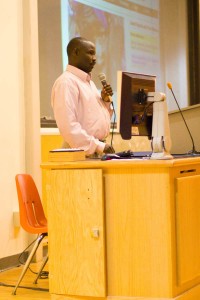By Hyuna Yong
Correspondent

Massacre, assault and civil war have been a part of Darfur, Sudan, since the Darfur conflict began over a decade ago, but on Oct. 27 the issue was brought to the College.
Daowd Salih, president of Damanga Coalition for Freedom and Democracy, spoke about the current situation in Darfur during a presentation sponsored by the College’s Amnesty International.
Mohamed Adam Yahya, the founder of Damanga, was also expected as a speaker to the event, but was not able to come due to lack of funding, according to Amnesty International’s president, Jacqueline Bossart, junior sociology major.
During his presentation, Salih discussed the origins of the conflict in Darfur, which stem as far back as the 1990s when non-Arab ethnic groups, such as the Fur tribe, which are Muslim but still strongly follow their African culture, were massacred by Arab militias.
“They don’t believe our Islam, because we are not completely Muslim, they think” Salih said.
Today the conflict is not only a matter of race and religion, but also an issue of land and resources, he said.
“It’s a very, very complicated crisis,” Salih said.
Salih’s organization, Damanga Coalition for Freedom and Democracy, seeks to “aid the disempowered, including the victims in the Darfur conflict” and promote awareness about such conflict to the United States, according to the organization’s Website. It was founded by members of Representatives of the Massaleit Community in Exile (RMCE), which wrote one of the first letters in history about the ethnic cleansings in Darfur.
Salih, one of the founders of RMCE when he was a student in Cairo, also stressed how students can make a difference by bringing awareness about this issue to the campus. He also said students can volunteer or intern through Damanga by editing, utilizing their computer skills, and fundraising.
Overall, the presentation had a positive effect for the audience. “I thought it was really informative because you don’t hear much about it,” said Emmanuel Martinez, sophomore chemistry major.
He said the first-hand perspective of a refugee enhanced the lecture and was pleased with the speaker’s stress on the importance of education.






